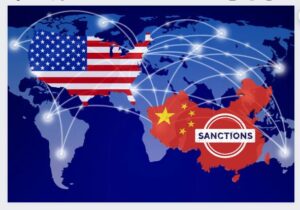Avoiding International Fraud
The digital age has opened the floodgates to a sophisticated era of international scams. These schemes are crafted with such cunning and complexity that even the smartest and savviest individuals and organizations get ensnared.
This guide aims to arm you with the necessary knowledge and strategies to navigate through the murky waters of international fraud, ensuring you can recognize and evade these potential traps effectively.
Why International Scams Thrive
Scammers are drawn to the international arena for a reason: complexity. Different languages, cultures, and legal systems create confusion, making it harder for victims to identify red flags and to seek recourse if scammed.
Nearly all scams seek to exploit basic human psychology. The allure of a great deal, the desire for a quick win, and the cultural tendency to trust those from seemingly prestigious backgrounds (like a company with a foreign address) are used to cloud judgment.
Identifying the Red Flags of International Scams
While scams come in various flavors, they often share some warning signs:
- Unexplored Business Relationships: Being contacted out of the blue by a foreign company, especially for a large transaction, is cause for concern.
- Inconsistent Information: Look for discrepancies in company documents, website information, and communication. Misspelled words, illogical business practices, and inconsistencies in contact details are all red flags.
- Unrealistic Promises: If something seems too good to be true, it probably is. Outlandish returns, pressure to act quickly, and guaranteed success are typical hallmarks of a scam.
- Urgency and Pressure Tactics: Scammers often try to create a sense of urgency to cloud your judgment and rush you into a decision. Don’t be pressured into acting before thoroughly investigating.
- Communication Difficulties: Difficulty reaching the company by phone or encountering vague or evasive answers to your questions are common signs of something fishy.
- Requests for Unusual Payments: Being asked to wire money overseas, especially to private accounts, or pay upfront fees with non-reputable payment methods are red flags.
Understanding How International Scammers Exploit Our Weaknesses
The desire to believe we’ve entered into a good deal can cloud our judgment. Scammers exploit these weaknesses by creating situations that make us want to believe everything is legitimate, even when red flags are present.
The below are just some of the real-life examples our international lawyers have seen that illustrate these tactics:
- Company documents showed a subsidiary in the Marshall Islands, yet always spelled the country as Marshal Island. It had no such subsidiary.
- Company claimed to have millions of dollars at an Australian Bank. A Google search quickly revealed the bank did not exist. We did the search because we thought the bank’s name (an Ocean not contiguous with Australia) was strange for a bank allegedly in Australia.
- Company claimed to have a branch office in a particular city, yet its documents on that branch office put that city in the wrong province.
- Company claimed to be bringing in twice as much product as physically possible on a particular Cambodian ship. When I first saw the amount of product involved, I thought “this must be a massive ship.” But I then doubted Cambodia had any ships of this size and 30 minutes of research on this particular ship revealed that it was not nearly large enough to carry the cargo.
- Company claimed to have been shipping product on a particular ship that did not exist during the first few years when the product was allegedly being shipped.
- Company claimed to have won an IP lawsuit in a country’s Supreme Court and they even produced a copy of the Supreme Court’s decision). I had a lawyer friend check this decision in the relevant country and there had never been such a case.
- Saw a judgment from a federal judge in Florida and the court’s order struck me as funny. I conducted a search on the judge and learned there was no such judge in the court listed on the order.
These examples highlight how scammers prey on our lack of knowledge about specific companies, locations, or legal systems.
International scammers are adept at exploiting basic human psychology to deceive their victims. At the core of many scams is the manipulation of trust and the exploitation of our desire for good fortune. Scammers often present themselves as reputable entities, using sophisticated forgeries or posing as officials from legitimate businesses to evoke trust. They know that once trust is established, skepticism is often sidelined.
One common psychological tactic is the ‘foot-in-the-door’ technique, where scammers start with a small, seemingly harmless request to establish a connection. Once the initial contact is made, they escalate their demands, knowing that the psychological barrier to refuse subsequent requests is lower once the initial compliance is granted.
Another technique is the “scarcity” principle, where scammers create a false sense of urgency by claiming that an incredible deal is a limited-time offer. This plays on people’s fear of missing out (FOMO) and can push them to act impulsively, bypassing their usual due diligence.
For instance, consider a scam where individuals are contacted by an alleged broker promising a once-in-a-lifetime opportunity to invest in a rare mineral found only in a remote part of the world. The broker might use technical jargon and fake documents to appear credible, and emphasize the urgency by stating that the investment window is closing soon. The potential for high returns and the fear of missing out can override rational decision-making, leading individuals to invest without proper verification.
Scammers also exploit the “halo effect”, where the perception of a positive trait (such as a business being located in a prestigious financial district) extends to other areas, such as trustworthiness or financial stability. This can cause individuals to overlook glaring red flags because their judgment is clouded by the initial positive impression.
I cannot even tell you how many times scammers use a prestigious London or Singapore address to try to make themselves look good. I also cannot even tell you how many times my Google search on the address revealed it to be a complete fake. My favorite was the “high end London investment bank” whose address was actually a Blimpie fast food location.
Understanding these psychological tricks can help you remain vigilant and question scenarios that might otherwise seem credible at first glance. Always maintain a healthy skepticism and conduct thorough due diligence before proceeding with any international transaction.
Essential Safeguards Against International Scams
Now that you’re familiar with the scammer’s playbook, here are crucial steps you can take to protect yourself:
- Conduct Due Diligence: Don’t just take a company’s word for it. Research them online through government registries, business directories, and independent news sources. Look for reviews and complaints from other customers. See Due Diligence on Foreign Transactions
- Verify Information: Double-check company addresses, phone numbers, and bank details. Consider getting help from attorneys experienced with international business verification.
- Beware of Advanced Fee Scams: Never send money upfront, especially for things like “processing fees” or “administrative costs.” Legitimate businesses almost never require such payments before finalizing a deal.
- Use Secure Payment Methods: When making international payments, opt for secure methods like bank transfers or escrow services that offer buyer protection. Avoid using money transfers or virtual currencies, as they are difficult to trace in case of fraud.
- Get Everything in Writing: Always have a written contract outlining the terms of the agreement, including payment schedules, delivery details, and dispute resolution procedures.
- Be Wary of Unexpected Windfalls: If an opportunity seems too good to be true, it probably is. Do your research and understand the market rates before committing to any investment.
- Trust Your Gut: If something feels off, don’t ignore that feeling. Scammers often rely on creating a sense of urgency or excitement to cloud your judgment. Take a step back, reassess the situation, and don’t hesitate to walk away if you have doubts.
Proactive Strategies for Safe International Dealings
Though recognizing red flags is crucial, a proactive approach is even better. Here are some additional tips to ensure safe international transactions:
- Work with Reputable Partners: Build relationships with established businesses in your target market. Consider attending trade shows or industry conferences to connect with potential partners face-to-face.
- Seek Professional Guidance: Consult with an international lawyer with experience with the relevant country. They can help you navigate legal and regulatory complexities and identify potential pitfalls and scams.
- Consider Payment Terms with Caution: Be wary of overly generous payment terms, especially from unknown companies. Consider using a letter of credit, which helps ensure payment is released only after certain conditions are met.
- Stay Up to Date on Scams: Scammers constantly develop new tactics. Stay informed by reading news articles, subscribing to scam alert services, and attending workshops on international fraud prevention.
What to Do If You Think You’ve Been Scammed
If you suspect you’ve been a victim of an international scam, here are some immediate steps to take:
- Stop Communication: Don’t respond to any further emails or calls from the scammer.
- Gather Evidence: Collect all documentation related to the transaction, including emails, contracts, and payment receipts.
- Report the Scam: File a report with the authorities in your country and the country where the scam originated, if possible. Consider reporting the scam to relevant industry associations or online fraud databases.
- Seek Legal Advice: Consult with an attorney specializing in international fraud to discuss your options and explore the possibility of recovering your losses.
Conclusion: Knowledge is Your Best Defense
By familiarizing yourself with common scams, adopting a cautious approach, and implementing the safeguards outlined above, you can reduce your chances of falling victim to fraud. With a healthy dose of skepticism, thorough research, and a commitment to due diligence, you can greatly reduce your chances of getting scammed.
For more on international scams, check out the following:
How British firms built a pyramid scheme in China that lost millions. This Reuters article discusses a massive scam that used a London address to convince Chinese investors to invest millions into a fake currency hedge fund
China’s Most Common Scams. In this post, we discuss China’s most common scams, which are also the most common scams worldwide.
What to Do If You Think You Are a Victim of Internet Fraud. This post goes into great detail regarding butchering the pig scams and bank switch scams, and it explains what you should quickly do if you think you are a victim of Internet fraud.

























